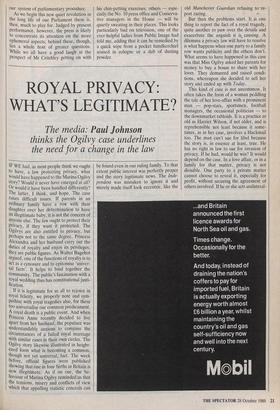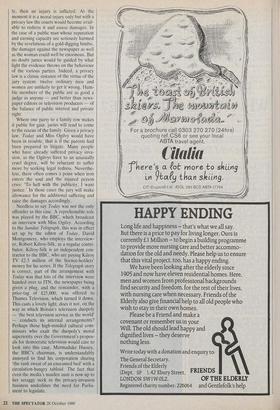ROYAL PRIVACY: WHAT'S LEGITIMATE?
The media: Paul Johnson
thinks the Ogilvy case underlines the need for a change in the law
IF WE had, as most people think we ought to have, a law protecting privacy, what Would have happened to the Marina. Ogilvy story? Would it never have emerged at all? Or would it have been handled differently? The latter, I think, and hope. The case raises difficult issues. If parents in an ordinary family have a row with their daughter over her determination to have an illegitimate baby, it is not the concern of anyone else. The law ought to protect their privacy, if they want it protected. The Ogilvys are also entitled to privacy, but perhaps not to the same degree. Princess Alexandra and her husband carry out the duties of royalty and enjoy its privileges; they are public figures. As Walter Bagehot argued, one of the functions of royalty is to 'act as a cynosure and to epitomise 'univer- sal facts'. It helps to bind together the community. The public's fascination with a royal wedding thus has constitutional justi- fication.
If it is legitimate for us all to rejoice in royal felicity, we properly note and sym- pathise with royal tragedies also, for these too universalise our common predicament. A royal death is a public event. And when Princess Anne recently decided to live apart from her husband, the populace was understandably anxious to compare the circumstances of a failed royal marriage with similar cases in their own circles. The Ogilvy story likewise illustrated in height- ened form what is becoming a common, though not yet universal, fact. The week before, official figures were published showing that one in four births in Britain is now illegitimate. As if on cue, the be- haviour of Marina Ogilvy reminded us that the tensions, misery and conflicts of view which that appalling statistic conceals can
be found even in our ruling family. To that extent public interest was perfectly proper and the story legitimate news. The Inde- pendent was mistaken to ignore it and merely made itself look eccentric, like the old Manchester Guardian refusing to 're- port racing.
But then the problems start. It is one thing to report the fact of a royal tragedy, quite another to paw over the details and exacerbate the anguish it is, causing. A dilemma a privacy law will have to resolve is what happens when one party to a family row wants publicity and the others don't. What seems to have happened in this case was that Miss Ogilvy asked her parents for money to buy a house to share with her lover. They demurred and raised condi- tions, whereupon she decided to sell her story and ended up with Today.
This kind of case is not uncommon. It often takes the form of a woman peddling the tale of her love-affair with a prominent man — pop-stars, sportsmen, football managers, the occasional politician — to the downmarket tabloids. It is a practice as old as Harriet Wilson, if not older, and is reprehensible not least because it some- times, as in her case, involves a blackmail too. The man can't sue for libel because the story is, in essence at least, true. He has no right in law to sue for invasion of privacy. If he had, would he win? It would depend on the case. In a love affair, or in a family for that matter, privacy is not divisible. One party to a private matter cannot choose to reveal it, especially for profit, without securing the agreement of others involved. If he or she acts unilateral- ly, then an injury is inflicted. At the moment it is a moral injury only but with a privacy law the courts would become avail- able to redress it and assess damages. In the case of a public man whose reputation and earning capacity are seriously harmed by the revelations of a gold-digging bimbo, the damages against the newspaper as well as the woman could well be enormous. But no doubt juries would be guided by what light the evidence throws on the behaviour of the various parties. Indeed, a privacy law is a classic instance of the virtue of the jury system: twelve ordinary men and women are unlikely to get it wrong. Hum- ble members of the public are as good a judge as anyone — and better than news- paper editors or television producers — of the balance of public interest and private right.
Where one party to a family row makes it public for gain, juries will tend to come to the rescue of the family. Given a privacy law, Today and Miss Ogilvy would have been in trouble, that is if the parents had been prepared to litigate. Many people who have already suffered privacy inva- sion, as the Ogilvys have to an unusually cruel degree, will be reluctant to suffer more by seeking legal redress. Neverthe- less, there often comes a point when iron enters the soul and the injured person cries: 'To hell with the publicity, I want justice.' In those cases the jury will make allowance for the additional suffering and raise the damages accordingly.
Needless to say Today was not the only offender in this case. A reprehensible role was played by the BBC, which broadcast an interview with Miss Ogilvy. According to the Sunday Telegraph, this was in effect set up by the editor of Today, David Montgomery, who employs the interview- er, Robert Kilroy-Silk, as a regular contri- butor. Kilroy-Silk is an independent con- tractor to the BBC, who are paying Kilroy TV £2.5 million of the licence-holders' money for his series. If the Telegraph story is correct, part of the arrangement with Today was that bits of the interview were handed over to ITN, the newspaper being given a plug, and the remainder, with a price-tag of £25,000, was offered to Thames Television, which turned it down. This casts a lovely light, does it not, on the way in which Britain's television duopoly
— 'the best television service in the world' — conducts its internal arrangements? Perhaps those high-minded cultural com- missars who exalt the duopoly's moral superiority over the Government's propos- als for democratic television would care to look into this case. Marmaduke Hussey, the BBC's chairman, is understandably annoyed to find his corporation sharing `the rank sweat of an enseamed bed' with a circulation-hungry tabloid. The fact that even the media's maiden aunt is now up to her scraggy neck in the privacy-invasion business underlines the need for Parlia- ment to legislate.



































































 Previous page
Previous page